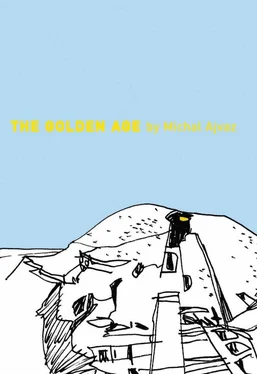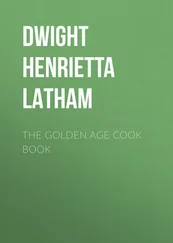Michal Ajvaz - The Golden Age
Здесь есть возможность читать онлайн «Michal Ajvaz - The Golden Age» весь текст электронной книги совершенно бесплатно (целиком полную версию без сокращений). В некоторых случаях можно слушать аудио, скачать через торрент в формате fb2 и присутствует краткое содержание. Год выпуска: 2010, Издательство: Dalkey Archive Press, Жанр: Современная проза, на английском языке. Описание произведения, (предисловие) а так же отзывы посетителей доступны на портале библиотеки ЛибКат.
- Название:The Golden Age
- Автор:
- Издательство:Dalkey Archive Press
- Жанр:
- Год:2010
- ISBN:нет данных
- Рейтинг книги:4 / 5. Голосов: 1
-
Избранное:Добавить в избранное
- Отзывы:
-
Ваша оценка:
- 80
- 1
- 2
- 3
- 4
- 5
The Golden Age: краткое содержание, описание и аннотация
Предлагаем к чтению аннотацию, описание, краткое содержание или предисловие (зависит от того, что написал сам автор книги «The Golden Age»). Если вы не нашли необходимую информацию о книге — напишите в комментариях, мы постараемся отыскать её.
is Michal Ajvaz’s greatest and most ambitious work.
The Golden Age
The Golden Age — читать онлайн бесплатно полную книгу (весь текст) целиком
Ниже представлен текст книги, разбитый по страницам. Система сохранения места последней прочитанной страницы, позволяет с удобством читать онлайн бесплатно книгу «The Golden Age», без необходимости каждый раз заново искать на чём Вы остановились. Поставьте закладку, и сможете в любой момент перейти на страницу, на которой закончили чтение.
Интервал:
Закладка:
I can imagine that in today’s Book there are none of the figures I read about when I was on the island: no Tana, no Dru, no Gato, no Hios. They have been replaced by other characters, whose stories perhaps bear echoes of the heroes I knew. And certainly in the features of these new heroes, the faces of the heroes who will replace them will be germinating. The giant squid has disappeared. So, too, has the statue in jelly. Perhaps the whole archipelago has been claimed by the sea, and new islands and continents have sailed out onto the Book ’s pages. Perhaps new stars are shining in the galaxies of its universe, and there are new planets on which unknown civilizations will thrive and expire, circling in this imaginary universe born out of the practically imperceptible breath of its script, for as long as it takes for the Book to devour them. And because islanders have bad memories, the heroes, towns and islands, planets and galaxies that were described in the Book at the time I sat on the terrace of Karael’s house, do not even exist in anyone’s mind.
During my stay on the island I learned from its inhabitants many bad and also several good things. But I have never been able to welcome change and extinguishment with the same joy as they did. It was my secret hope that the characters disappearing from the island’s Book would live on at least in my report about the island. But my memory is the not the best either; it was so often mistaken that I am afraid the characters and deeds of my telling have little in common with those I read about on the island. It sometimes happened while I was writing that I remembered something from the text of the Book as I first experienced it; but when I returned to the passages I now believed to be wrong in the hope of rewriting them, I had to laugh at the futility and ridiculousness of such efforts. It dawned on me what nonsense it was to strive for fidelity in something that was constantly changing shape, that no one could confirm, that lived on only in my memory, which had failed me several times already.
Karael no longer telephones or writes, so I have no news of what has happened to the Book since my departure. It is possible that its stories have crumbled, leaving nothing but isolated sentences and words. It is even possible that they have been erased by the soaking into its pages of the water of the upper town or the waves of the sea, that the islanders now pass from hand to hand a Book with blank white pages filled only with phantoms, on which the contours of new shapes and bodies are beginning slowly to beat out the rhythms of new stories.
Was the Book a genuine work of art? Now I would probably hesitate before I answered that. Part of art is constancy and invariability, but not because it should raise itself above time and approach the world of eternal shapes and values: art must descend to constancy because only from the chasm of this descent, from the misery of non-variability, can it face the challenges of the endlessly transforming, which is what art yearns for, adores and sings about; only a motionless statue that immerses itself in the current of time can address the undulations of transformation. And a work of art should have a single author. It cannot be written by a multitude of anonymous islanders — not because it is an expression and a celebration of individuality, but because it must descend to the poverty of a single voice; only out of this poverty can it respond to the abundance of voices of the world, in which it wishes to dissolve itself. Only in its misery and impotence can the uncertain echo of these voices arise, and all the sonorous voices of the world can reveal themselves only as the tremor of sadness in a single voice for its inadequacy.
As a work of art, the island’s Book was a failure from the very beginning. It is fairly certain that it was this failure the islanders were striving for. There was no need for Ino of the white ankles to fly to the island: the people that lived there knew very well what she had to impart, it was written in their blood. Now I believe that the Book was ridiculing art, was a parody of art. The islanders did not like art because its shapes stood in the way of their eddies of shapelessness, and its sounds drowned out the music of silence. To begin with I wondered if Mii, Fo and all the other artists who kept appearing on the pages of the Book , were the expression of some kind of islanders’ dream of real art, a permanent, unchanging work of art, but then I realized that for the islanders such characters were laughable or pitiful, that their often woeful fates were meant to show where a yearning for shape could lead. I know now that the Book was not just a parody of art; it was a parody of our world as a whole, fragments of which would arrive on the island in each ship that came into port.
The supposition that the Book was a work of art was also based on the view that the island’s literature was a response to the summons of shapeless murmurs and eddies that yearned for the release of the images concealed in them. But having returned to the Book and drawn from my memory certain of its passages, I was no longer sure that its roots contained the desire of the shapeless for shape, and if so, then only as a part of the circling that both the shaped and the shapeless contain and overlap with. Now I would explain the origins of the stories of the Book more simply and in a way more in keeping with the character of the islanders: at the core of the shapeless there is a blind, irresistible pressure to expel images, so that after some time the purity of the shapeless is clouded by a sediment of images, which are at various stages of development. If this were so, the writing and reading of the Book would be a cleansing process by which the shapeless would rid itself of sediment, draining away all the shapes and images that had settled in it. Renewing the limpidity of the Book would make it possible for the islanders to bathe in pure streams of the shapeless. The Book was not an end in itself but a mere by-product; it was a filter that caught the dirt of shapes and images.
On my travels around Prague I have yet to spot in a travel agent’s window a colour photo of the island. It seems that there is still no modern hotel on its shores. But even if there were, this would not have to mean the destruction of the island’s culture. I have written of how hitherto the islanders have always been cunning victors over the culture of Europe. Perhaps this time it would be different; perhaps in time the streets of the lower town would fill with restaurants, souvenir shops and ice-cream stands; perhaps loud music would drown out the island’s murmurs and rustlings. But it might happen that a fresh encounter with Europe would lead to another victory on the part of the islanders; let us remember that the islanders have always won as easily and unwittingly as they draw breath. We know how the European invasion of long ago ended, and it is more than likely that the colourful emblems of multinational corporations would penetrate the streets of the lower town only to transform in the same way as the conqueror’s geometric drawings and devotional pictures — they would be overwhelmed by stains and webs of cracks, the music playing in the streets would be infiltrated more and more by rustlings and murmurs, so that all would be overgrown as surely as the once-proud buildings were covered in creeping plants. And things might not end here — the changes might spread to Europe and America, they could transform whole continents; whole world civilizations might come to resemble the life of the island. And then my book would be for nothing, as it would speak of banalities known by all.
Читать дальшеИнтервал:
Закладка:
Похожие книги на «The Golden Age»
Представляем Вашему вниманию похожие книги на «The Golden Age» списком для выбора. Мы отобрали схожую по названию и смыслу литературу в надежде предоставить читателям больше вариантов отыскать новые, интересные, ещё непрочитанные произведения.
Обсуждение, отзывы о книге «The Golden Age» и просто собственные мнения читателей. Оставьте ваши комментарии, напишите, что Вы думаете о произведении, его смысле или главных героях. Укажите что конкретно понравилось, а что нет, и почему Вы так считаете.












